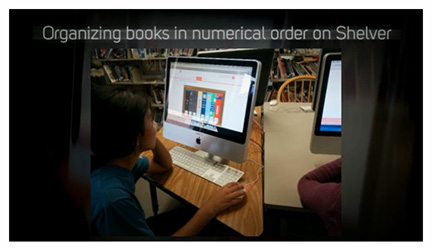Maya Bery, School Library Media Specialist, attended the 2013 American Association of School Librarians Conference in Hartford, CT with funding from a CEF Teacher Development Grant. Below is a brief summary of her report on the conference that describes her experiences. You can view a short video Maya prepared of some of the new ideas already at work in our library by clicking here.
Impact on Carlisle School after attending AASL
The most visible impact from the sessions I attended stems from a session given by the Newton elementary library team. These librarians have worked to transform their libraries into learning commons, spaces that better facilitate access to resources and foster collaborative learning. (Former CPS Librarian) Sandy Kelly began this process, and since returning from Hartford, I have continued it, turning a critical lens to everything from the height of the shelves to signage and even furniture arrangement. Students have responded positively to the changes I have made so far, and I look forward to making the space more user-friendly over time.
I am also already directly implementing ideas I learned at other sessions into my library curriculum. For instance, a workshop on using non-fiction texts to teach students about current events and history has led directly to an ongoing unit with students in grades pre-K through 3 on the Civil Rights Movement. In younger grades, I have selected age-appropriate read-aloud books and had discussions with students about the Civil Rights Movement. In 2nd and 3rd grades, students are transitioning from hearing books read to them to conducting independent research on different Civil Rights personalities.
A session on using Scratch, an online computer programming tool created by MIT, inspired me to introduce students to coding through code.org. The session demonstrated a variety of ways students as young as 2nd grade had learned to create animations on Scratch to express their learning – everything from personal interest topics to demonstrating lessons on cybersafety. Intrigued, I began to explore the idea of coding through code.org, and upon learning of the Week of Code, an event designed to improve instruction in coding in schools across America, decided to introduce the site to students. They loved it. Not only were they having fun, they were practicing vital critical thinking and problem solving skills. Students in 4th grade are presently working on a standards-based mythology project where they will explore a myth and its connection to a vocabulary word or phrase, then create original animations using Scratch to illustrate what they have learned.
Some unanticipated results
While I had a good sense heading into the conference what I might learn at the actual sessions, I did not know what I might learn from the poster session on Thursday evening. To my delight, I came across multiple ideas that I hope to put into practice. The biggest one is working with 8th grade ELA teacher Marcella Pixley to pilot a peer-based writing mentor program, hosted in the library. We, along with the support of the middle school ELA faculty, plan to create a manual, film video examples, and train students to be writing mentors to other students who need help or support at any stage of the writing process.
 Also, as I stated earlier, I have begun working towards making the library a more user-friendly space. While I realized that lowering the height of the shelves to under 5 feet would help make materials more accessible, I didn’t realize that my new system of creating micro-categories of certain Dewey topics would expand students’ abilities to independently browse and locate materials. Not only am I seeing students navigate the shelves more easily, I am also seeing students actively realizing that there are other books on the same topic around the particular book they seek.
Also, as I stated earlier, I have begun working towards making the library a more user-friendly space. While I realized that lowering the height of the shelves to under 5 feet would help make materials more accessible, I didn’t realize that my new system of creating micro-categories of certain Dewey topics would expand students’ abilities to independently browse and locate materials. Not only am I seeing students navigate the shelves more easily, I am also seeing students actively realizing that there are other books on the same topic around the particular book they seek.
Positive impact across the school community
The impact of my attendance at AASL can be felt throughout the school community and across grade levels. The position of the school librarian is a unique one in the school community, as I am solely responsible for meeting the needs of the entire student body while also supporting the faculty. As part of fulfilling the conditions of the grant, I am currently teaching a Carlisle College class on using infographics as a tool for professional development, instructional aid, and student assessment. Over the course of the workshop, teachers will learn to evaluate infographics, incorporate infographics into their classrooms, and create their own, original infographics (or guide students to do the same). The idea for this course stemmed from a specific session on infographics at AASL, but also from the conversations throughout the conference centered on making students literate in multiple ways (visually, technologically, etc).
Marcella Pixley and I are also committed to and excited at the prospect of developing the writing mentor program into an institutional fixture. We recognize that this will take time and probably not bear fruit for several years to come, but our goal is to create a culture of peer support in the middle school where students who need help with writing feel comfortable and confident in seeking out that help independently to help them become stronger writers. I anticipate we will measure success by tracking the number of students who use the program, conducting surveys to gauge feedback, and anecdotally observing the progress of struggling writers.
